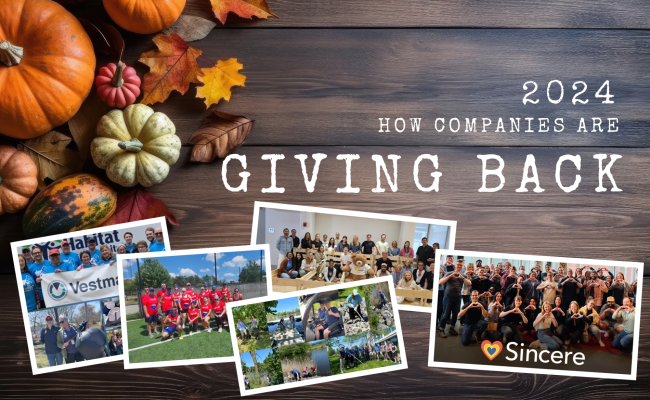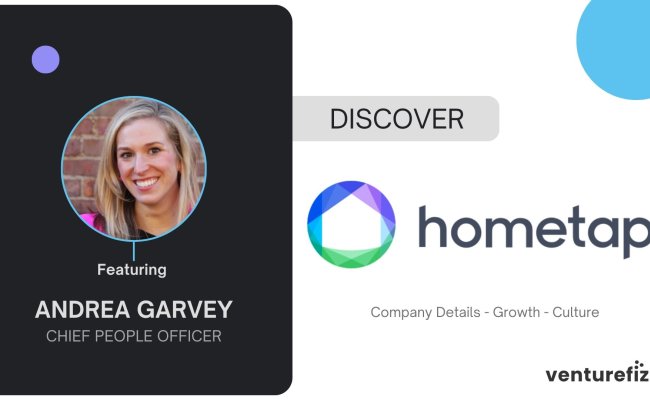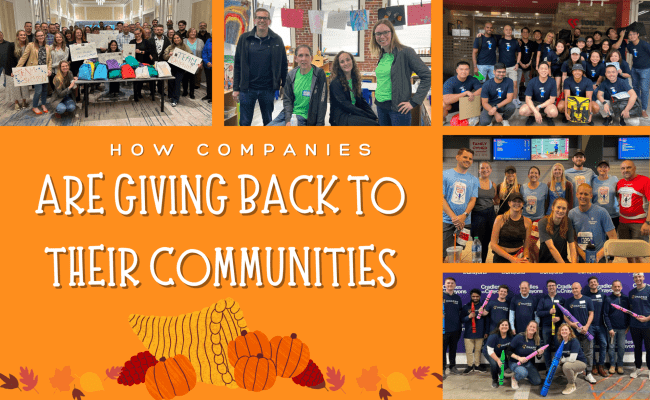Sign up for personalized job alerts, daily insights, & weekly career advice.
In This Video
Don't miss our interview with Moe Khan, Vice President of Engineering, which has everything you need to know about working at Hometap and their engineering team!
During this video interview, Moe discusses:
- About Hometap and what they do
- Details on Hometap's engineering team
- Cool projects engineers get to work on
- Details on the tech stack
- What to expect during the interview process
- Why now is the ideal time to join
- And more!
About the
Company
Hometap provides homeowners cash upfront in exchange for a minority stake in their residential property so homeowners can pursue their financial goals.
View Company PageJobs at hometap
Related
Transcript
About Hometap and what they do
My name is Moe Khan as no surprise to anybody, my friends call me Moe. And Hometap is a Boston based FinTech company that really makes homeownership less stressful and more accessible. And that is the mission that we're all driving towards. And I run our engineering and technology team here at Hometap. I've been here less than a year. And, you know, I will tell you that my first reaction when I first heard about Hometap, through a VC friend of mine was was likely very similar to, you know, I'm certain many of the venturefest followers out there, it's first reaction as well, which is for your mind to naturally go to some of these traditional legacy products that are available out there. For example, you know, your traditional loan products that are available, but what we do is something entirely different. And I'm sure you've heard that from a lot of different companies. But this is really a novel financial product. And if you think about home ownership, especially over the course of the last few years, here in America, you you really think about the vast multitude of folks who are house rich, but cash poor, meaning, you know, especially given the circumstances over the last couple of years, struggling to make ends meet on a cash flow, month to month basis, yet sitting on equity in their homes, that traditionally, the only way for them to be able to access is either sell their homes, less desirable for obvious reasons, or take out a loan, which further compounds their cash flow problem on a month to month basis. So what we do in our novel first financial product is we will actually make an investment in the equity of a homeowners home and give them near immediate access to cash in exchange for a future percentage of their home's value. So as the home appreciates, we share, potentially, if the home depreciates we share as well. And the cash could be used for a multitude of different reasons, we have a slew of different use cases for our homeowners, but some of the more popular ones are paying off debt, whether that be credit card debt, or you know, medical bills, we have homeowners who want to start a business, we have homeowners who want to do renovations or you know, fund education. And so all of those are kind of our typical use models for our novel financial product. And as you can imagine, all of these things are, make it very obvious towards the mission statement that we have of making homeownership less stressful and more accessible.
Details on Hometap's engineering team
I think I'll take a bit of a circuitous answer to the organizational question about how we're structured. So in much the same way that the financial product that we offer is novel and unique. You know, so is our business, and so is our application of software. So it's particularly unique for me, because I have never prior to Hometap work for a company where the technology itself is not the product directly. Our product is our home equity investment. So I think, again, naturally, a typical engineer mentality would be to think about the additional layer of abstraction that creates between the work that we're doing, and our customers, but it's actually quite the contrary. So even though the software is not the direct product, it enables everything that our business does either directly interfacing with our homeowners, where all of the facets of the business internally at Hometap. And what I mean by that is we have an absolutely amazing marketing team that is making our product more accessible tomorrow, our homeowners, we have an a sales team, which we internally call is our investment managers. And we have a truly passionate operations team, making sure that all of the backend process of how you get investments into homeowners, hands happens, you know, as efficiently as possible. So prior, our engineering organization was actually structured, historically, with more of a front end and a back end focus. But knowing more intimately how our business is done, it made a lot of sense for us to be aligned in the same facets. So our engineering organization is actually structured so that instead of having dedicated front end and back end resources, and recognizing that the needs of our marketing team, and our sales team and our operations teams are a combination of both of those and much more project oriented the engineering organization is actually structured in the same fashion. So we have a team dedicated towards the needs of our marketing organization. We have a team dedicated to our sales folks or investment managers, and we have a team dedicated to our operations team. And we also have recognizing that we have legacy technology and we need dedicated effort towards thinking about how our platform will evolve. We actually also have a team of architects, certainly not your traditional Ivory Tower, folks, but you know, people who are hands on working on each of the individual projects, but also available to think about what the future of our technology needs to look like how our platform will evolve, but also be available to, you know, act as guidance and mentors towards all of the new development that we're doing in each of those team.
Cool projects engineers get to work on
As far as cool projects are concerned, so this is great, given that the organization is actually divided up into these different facets, and by the way, we of course, will have mobility and availability for people to be able to move between the teams and, and get engaged with the, you know, the technology with which they're most passionate. But, you know, I'll give you some examples. So, if you are passionate about front end, our marketing team is building a very modern, you know, self building front end website with capabilities of integration of multiple different content management systems, but also making it possible for our marketing folks to, to edit and create new content dynamically, and autonomously. We are integrating with all sorts of partners, referral partners, website partners, and the API's that we've created to add all sorts of extensibility to the way in which we communicate with those homeowners, if you are passionate about the sales process, we're doing a lot of really unique integrations with, you know, native sales, working environments, which are third party tools. And if your back and passionate, we've got, you know, a multitude of work for things like optimizing our data models, because we literally, you know, have hundreds of abstractions that we need to work with, if you're passionate about data science, and how that can be used to integrate, you know, predictive capabilities for the complexity of a particular application, and how we could dynamically flow that into the workflow of our existing employees so that we get, you know, decisions to our homeowners and investments to our homeowners as soon as possible. All of those facets are part of our equation. And also, you know, we're very much in the nascent seat of our next generation growth process as well. So, you know, our original application admittedly was more monolithic, and that suited the needs of the company in that time as best as possible. I'm very much not one who believes that, you know, the only way to build an architecture for software is to adopt the latest buzzwords, and you know, start with a microservices environment. But it's obvious to us that we need to be able to migrate to a more service oriented architecture. And so that's very much happening right now for us as well. So if you're interested in modern software architecture, and you know, the evolution of a needs based service oriented architecture, that's where we're headed as well. So really, all facets of the different types of our organization and different areas of software development are parts of the cool projects that we're working on here at Hometap.
Details on the tech stack
Honestly, the tech stack is likely something that many of your followers are, you know, very familiar with, for example, we have a largely Python based back end. And you know, we have multiple frameworks, but the bulk of the work for back end is done in the Django framework, and we do have some flask as well, our front end is is largely react, and you know, we are definitely involved in modern single page application development for much of the front end work. But we also have in, again, the early stages of our continuous integration and continuous deployment phases, modern CI CD and DevOps pipeline that we're working on building and, you know, all of the technology that's associated with building a, you know, a cloud native and cloud resident application. So, you know, our tech stack is what the majority of the industry is familiar with, and using to be able to facilitate the capabilities that you need in any cloud native environment.
What to expect during the interview process
I would actually say that our interview process is very much an analog of Hometap as a company, meaning that it's a combination of, you know, traditional interview process, as well as novel process and what I think is, you know, a bit non traditional, but unique to our environment, and helps both us as well as our candidates get a really good sense of what it's like to work at Hometap. And what it involves, is, you know, your traditional initial reach out with with our fantastic HR team, and we have internal recruiters who will initially engage with folks and talk to them about what it is that they're passionate about and learn more about them. And then our second phase is usually a more technical deep dive with the hiring manager of any one of the teams or myself and the, again, pretty traditional stages and an interview process but the the next phase, we do ask our candidates to to perform an exercise, take home exercise, and we certainly don't want folks to you know, make a huge weekslong project out of it. But we give candidates the opportunity to then join a panel which is cross functional made up of you know, product folks, QA folks, you know, You're in junior developers management. And this is really an opportunity for the candidates to know what it's like a day in the life of engineering here at Hometap. This is quite literally how our process works as far as moving projects forward. And we find that it's best for candidates to really get a natural sense of, you know, how we have a, you know, very high sense of humor environment. And, you know, our interview process and panel is reflective of that. And I think it helps candidates to both be at ease and recognizing that, you know, they've put time and effort into this exercise, they get an opportunity to share it with the team, they get an opportunity to show off their capabilities and skill set, but they also get to see what it's like to work with the actual people in the environment with, you know, with whom they would be day to day operating. And then after the panel, we will have, again, kind of more of your traditional sense of one on ones with some of the folks that are on the team. And sometimes those, you know, dig into the the classic technological elements. But you know, one of the things that I'm sure a lot of companies will swit say, but Hometap Absolutely lives by is that our values are a large part of our culture. And so our interview process actually involves almost all of our interviewers, you know, focusing on the things that are core values to the company, you know, for example, putting the team in the homeowner first, you know, creating solutions and collaborating with trust. So this is another facet in the way that we interview folks. And you know, candidates who are excited about working in an environment like that will will will really enjoy the the interview process here.
Why now is the ideal time to join
There are so many answers to the to the question of why now is an ideal time to join Hometap. So I guess I'll start by saying that, in 2021, we more than doubled the entire Hometap organization. And throughout the course of our next phase of development, especially with an engineering will come close to tripling the size of the engineering organization. So we are very much in a in a phase of unprecedented growth for the company. So folks that are excited about, you know, coming into an organization that is growing and all the challenges and exciting opportunity for innovation that happens just natively in the sense of that growth and technology. But you know, as we're building out this team, and as we can create further and further reach for access to our homeowners, all of these new areas of technology are going to require, you know, dedicated focus and the autonomy that comes from that is something that I find, you know, as an engineer is is hugely, you know, exciting, and an opportunity that that I'm drawn to, that's much, much of the reason why I came here to Hometap. But also, you know, if you are passionate about people who are genuinely interested in doing best by each other, now is the time to be able to join Hometap I came here excited about that opportunity. And I'm very proud that we continue to foster and grow those values here and now is the perfect time to add to that and bring your flavor of how you bring technology to help homeowners to the table.
Transcribed by https://otter.ai





